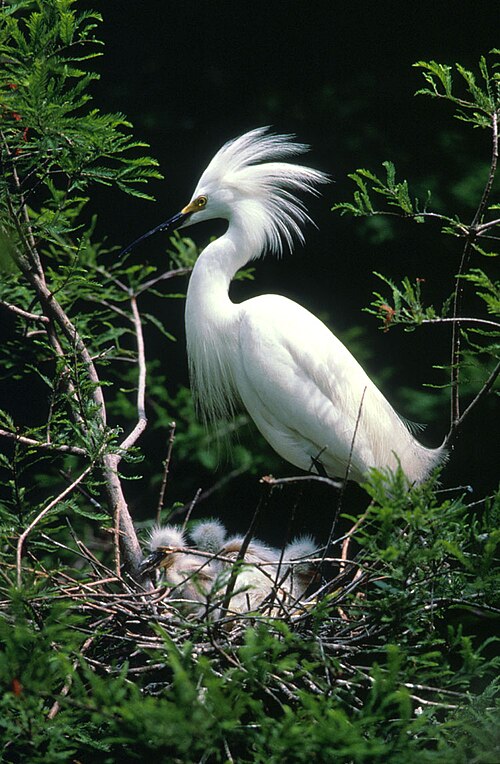Heronnoun
A long-legged, long-necked wading bird of the family Ardeidae.
Heronnoun
Any wading bird of the genus Ardea and allied genera, of the family Ardeidæ. The herons have a long, sharp bill, and long legs and toes, with the claw of the middle toe toothed. The common European heron (Ardea cinerea) is remarkable for its directly ascending flight, and was formerly hunted with the larger falcons.
Heronnoun
Greek mathematician and inventor who devised a way to determine the area of a triangle and who described various mechanical devices (first century)
Heronnoun
gray or white wading bird with long neck and long legs and (usually) long bill
Heronnoun
a large fish-eating wading bird with long legs, a long S-shaped neck, and a long pointed bill.
Heron
The herons are long-legged, long-necked, freshwater and coastal birds in the family Ardeidae, with 64 recognised species, some of which are referred to as egrets or bitterns rather than herons. Members of the genera Botaurus and Ixobrychus are referred to as bitterns, and, together with the zigzag heron, or zigzag bittern, in the monotypic genus Zebrilus, form a monophyletic group within the Ardeidae.
Cranenoun
Any bird of the family Gruidae, large birds with long legs and a long neck which is extended during flight.
Cranenoun
Ardea herodias, the great blue heron.
Cranenoun
A mechanical lifting machine or device, often used for lifting heavy loads for industrial or construction purposes.
Cranenoun
An iron arm with horizontal motion, attached to the side or back of a fireplace for supporting kettles etc. over the fire.
Cranenoun
A siphon, or bent pipe, for drawing liquors out of a cask.
Cranenoun
(nautical) A forked post or projecting bracket to support spars, etc.; generally used in pairs.
Craneverb
(ambitransitive) To extend (one's neck).
Craneverb
(transitive) To raise or lower with, or as if with, a crane.
Craneverb
(intransitive) To pull up before a jump.
Cranenoun
A wading bird of the genus Grus, and allied genera, of various species, having a long, straight bill, and long legs and neck.
Cranenoun
Any arm which swings about a vertical axis at one end, used for supporting a suspended weight.
Cranenoun
A machine for raising and lowering heavy weights, and, while holding them suspended, transporting them through a limited lateral distance. In one form it consists of a projecting arm or jib of timber or iron, a rotating post or base, and the necessary tackle, windlass, etc.; - so called from a fancied similarity between its arm and the neck of a crane See Illust. of Derrick.
Cranenoun
An iron arm with horizontal motion, attached to the side or back of a fireplace, for supporting kettles, etc., over a fire.
Cranenoun
A siphon, or bent pipe, for drawing liquors out of a cask.
Cranenoun
A forked post or projecting bracket to support spars, etc., - generally used in pairs. See Crotch, 2.
Cranenoun
The American blue heron (Ardea herodias).
Craneverb
To cause to rise; to raise or lift, as by a crane; - with up.
Craneverb
To stretch, as a crane stretches its neck; as, to crane the neck disdainfully.
Craneverb
to reach forward with head and neck, in order to see better; as, a hunter cranes forward before taking a leap.
Cranenoun
United States writer (1871-1900)
Cranenoun
United States poet (1899-1932)
Cranenoun
lifts and moves heavy objects; lifting tackle is suspended from a pivoted boom that rotates around a vertical axis
Cranenoun
large long-necked wading bird of marshes and plains in many parts of the world
Craneverb
stretch (the neck) so as to see better;

















